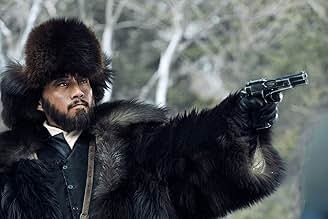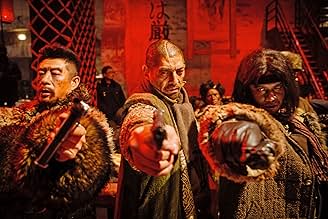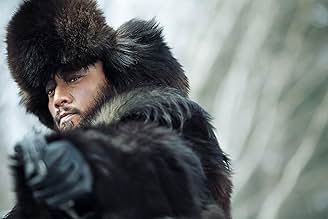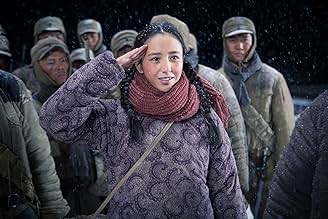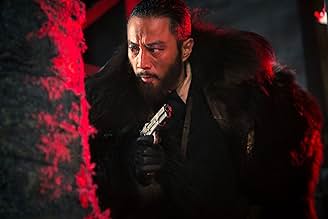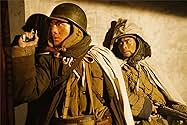La Bataille de la montagne du Tigre
Original title: Zhi qu wei hu shan
IMDb RATING
6.4/10
3.5K
YOUR RATING
A story focusing on a conflict between a People's Liberation Army squad and a bandit gang in north-east China during the Chinese revolution.A story focusing on a conflict between a People's Liberation Army squad and a bandit gang in north-east China during the Chinese revolution.A story focusing on a conflict between a People's Liberation Army squad and a bandit gang in north-east China during the Chinese revolution.
- Awards
- 21 wins & 41 nominations total
Featured reviews
Like John Woo's 'The Crossing', Tsui Hark's 'The Taking of Tiger Mountain' is set during the Civil War in the late 1940s; but instead of depicting the struggle between the People's Liberation Army and the Nationalists, Tsui and his four other screenwriters pit a certain Unit 203 of the PLA against a band of ruthless bandits whose stronghold is located high up in the snowy Tiger Mountain. Key to the PLA's strategy was a certain Yang Zirong, who infiltrated the bandits' stronghold and provided vital information which enabled his unit to triumph guerrilla-style against their more numerous and more well-equipped enemies.
No matter that he has been made to look like Hugh Jackman's Wolverine, Zhang Hanyu commands every single moment he is on screen as Zirong with a compelling performance of nuance and gravitas. While Lin Gengxin plays the righteous leader of Unit 203 Shao Jianbo with conviction and Tony Leung Kar-Fai is suitably hammy as the bandits' leader Lord Hawk, it is Zhang who truly owns the entire film, and it is no coincidence that his character is the most fully formed one of a movie which sometimes struggles to find the right balance of tone between fiction and history.
That is perhaps inevitable given the slightly uneasy fit between material and filmmaker. Much as Tsui Hark is no stranger to epics, he isn't exactly the sort of filmmaker who tells a straightforward historical tale – even his arguably most popular 'Once Upon A Time in China' trilogy about the legendary folk hero Wong Fei Hung was embellished with his penchant for the theatrical. And so it is with his latest, which depicts the heroism of the 203 Unit with the sort of self-serious posture which historical accounts typically adopt but the loutishness of the bandits with the sort of eccentricity that made his fantasy epics such as 'The Legend of Zu' and the more recent 'Detective Dee' enjoyable flights of fancy.
Amidst the tonal shifts, Zhang more than holds his own as Tsui's protagonist, an enigmatic stranger who joins the 203 with the medical officer Bai Ru (Tong Liya) and is at first met with doubt and scepticism by Jianbo. It is Zirong who comes up with the plan for him to go undercover by bringing to Lord Hawk a much coveted map with the locations of treasure left by the fleeing Japanese at the end of the Sino-Japanese war, and also to his quick-witted credit that he manages to win the trust of Lord Hawk to be sworn in as one of the league of brothers.
It is a shaky one though – not only is he tested from within by his Second Brother (Yu Xing) who stages a mock invasion by the PLA and Lord Hawk's woman Qinglian (Yu Nan) who is under orders to try to seduce him, Zirong's identity is also threatened when a spy planted by the bandits within the villagers escapes after a failed attack by the former on the PLA soldiers protecting the latter. Such moments of genuine tension are perfectly positioned to keep the narrative taut, which largely unfolds as a buildup to the storming of the bandits' fortress on the eve of New Year's Eve on the occasion of Lord Hawk's birthday.
Quite unlike the typical Tsui Hark movie therefore, this one has clearly fewer setpieces; indeed, we count just three – the first encounter between the PLA 203 Unit and the bandits at an abandoned warehouse; the failed attack led by Fifth and Sixth Brother on the village protected by the same unit; and finally the incursion of Lord Hawk's bastion to annihilate his reign of tyranny once and for all. Nonetheless, apart from some gimmicky slo-mo shots meant to justify the price of 3D for those who paid to see it with the additional dimension, these setpieces unfold with the scale and spectacle that one would expect from Tsui, the latter two in particular pop with thrill and imagination using a combination of old-school stunt staging and some nifty modern day CG effects.
Not quite so successful is Tsui's attempt to capture the poignancy of the historical event – besides Zirong, the rest of the PLA heroes are portrayed with as much dimension as a propaganda film commissioned by the Chinese government itself, especially when their enemies are cast as their complete opposites. A sub-plot based upon the reunion of mother and son – the latter a young boy named Knotti the 203 Unit rescues and the former who turns out to be Qinglian – is too manipulative to be persuasive, even more so when it is used to bookend the narrative with a prologue and a coda set in 2015.
Notwithstanding Tsui's autobiographical intent, the nexus that Tsui draws with present day is stretched most tenuously with an utterly unnecessary alternate ending that sees the Wolverine-lookalike Zirong turn into the very superhero by trying to rescue Qinglian from a twin-propeller plane that Lord Hawk is trying to take off in from a private airstrip in the mountain. As far as analogies go, this is a perfect example of the Chinese saying 'draw snake add feet' – so much so that its inclusion almost takes way what legitimacy Tsui had tried to build into the story in the first place.
As probably his first historical epic, 'The Taking of Tiger Mountain' sees Tsui Hark struggle to find the right balance between reality and myth. Tsui's best films have been those which have allowed him to express his own inner eccentricities, but which prove out of place in a straightforward recount like this. The narrative flaws are all too obvious at the start and at the end, but thankfully, as far as the titular tale is concerned, Tsui has fashioned a gripping story of espionage that does history justice.
No matter that he has been made to look like Hugh Jackman's Wolverine, Zhang Hanyu commands every single moment he is on screen as Zirong with a compelling performance of nuance and gravitas. While Lin Gengxin plays the righteous leader of Unit 203 Shao Jianbo with conviction and Tony Leung Kar-Fai is suitably hammy as the bandits' leader Lord Hawk, it is Zhang who truly owns the entire film, and it is no coincidence that his character is the most fully formed one of a movie which sometimes struggles to find the right balance of tone between fiction and history.
That is perhaps inevitable given the slightly uneasy fit between material and filmmaker. Much as Tsui Hark is no stranger to epics, he isn't exactly the sort of filmmaker who tells a straightforward historical tale – even his arguably most popular 'Once Upon A Time in China' trilogy about the legendary folk hero Wong Fei Hung was embellished with his penchant for the theatrical. And so it is with his latest, which depicts the heroism of the 203 Unit with the sort of self-serious posture which historical accounts typically adopt but the loutishness of the bandits with the sort of eccentricity that made his fantasy epics such as 'The Legend of Zu' and the more recent 'Detective Dee' enjoyable flights of fancy.
Amidst the tonal shifts, Zhang more than holds his own as Tsui's protagonist, an enigmatic stranger who joins the 203 with the medical officer Bai Ru (Tong Liya) and is at first met with doubt and scepticism by Jianbo. It is Zirong who comes up with the plan for him to go undercover by bringing to Lord Hawk a much coveted map with the locations of treasure left by the fleeing Japanese at the end of the Sino-Japanese war, and also to his quick-witted credit that he manages to win the trust of Lord Hawk to be sworn in as one of the league of brothers.
It is a shaky one though – not only is he tested from within by his Second Brother (Yu Xing) who stages a mock invasion by the PLA and Lord Hawk's woman Qinglian (Yu Nan) who is under orders to try to seduce him, Zirong's identity is also threatened when a spy planted by the bandits within the villagers escapes after a failed attack by the former on the PLA soldiers protecting the latter. Such moments of genuine tension are perfectly positioned to keep the narrative taut, which largely unfolds as a buildup to the storming of the bandits' fortress on the eve of New Year's Eve on the occasion of Lord Hawk's birthday.
Quite unlike the typical Tsui Hark movie therefore, this one has clearly fewer setpieces; indeed, we count just three – the first encounter between the PLA 203 Unit and the bandits at an abandoned warehouse; the failed attack led by Fifth and Sixth Brother on the village protected by the same unit; and finally the incursion of Lord Hawk's bastion to annihilate his reign of tyranny once and for all. Nonetheless, apart from some gimmicky slo-mo shots meant to justify the price of 3D for those who paid to see it with the additional dimension, these setpieces unfold with the scale and spectacle that one would expect from Tsui, the latter two in particular pop with thrill and imagination using a combination of old-school stunt staging and some nifty modern day CG effects.
Not quite so successful is Tsui's attempt to capture the poignancy of the historical event – besides Zirong, the rest of the PLA heroes are portrayed with as much dimension as a propaganda film commissioned by the Chinese government itself, especially when their enemies are cast as their complete opposites. A sub-plot based upon the reunion of mother and son – the latter a young boy named Knotti the 203 Unit rescues and the former who turns out to be Qinglian – is too manipulative to be persuasive, even more so when it is used to bookend the narrative with a prologue and a coda set in 2015.
Notwithstanding Tsui's autobiographical intent, the nexus that Tsui draws with present day is stretched most tenuously with an utterly unnecessary alternate ending that sees the Wolverine-lookalike Zirong turn into the very superhero by trying to rescue Qinglian from a twin-propeller plane that Lord Hawk is trying to take off in from a private airstrip in the mountain. As far as analogies go, this is a perfect example of the Chinese saying 'draw snake add feet' – so much so that its inclusion almost takes way what legitimacy Tsui had tried to build into the story in the first place.
As probably his first historical epic, 'The Taking of Tiger Mountain' sees Tsui Hark struggle to find the right balance between reality and myth. Tsui's best films have been those which have allowed him to express his own inner eccentricities, but which prove out of place in a straightforward recount like this. The narrative flaws are all too obvious at the start and at the end, but thankfully, as far as the titular tale is concerned, Tsui has fashioned a gripping story of espionage that does history justice.
8OMTR
Epic adaptation of a classic from Chinese literature, then from Peking Opera Troupe of Shanghai, based on the real-life story of the Battle of Tiger Mountain in 1946.
Positive: Good CGI, enough to make it a barely believable background and action scenes, but not great. Loosely based (meaning embellished for entertainment purposes) on post WWII varying factions vying for power in China as Japanese occupiers were being driven out.
Neutral: Interesting tie in with contemporary descendant revisiting and re-imagining that period. Acting, dialogue, script, filming, all acceptable and pretty standard, straightforward, but nothing jumps out as being incredible. It almost felt as if it was a Communist Party sponsored politically correct promotional film. Rather than being a serious historical docudrama it seemed more like a lighthearted fantasy story.
Negative: If looking for historical accuracy, then other than someone infiltrating a gang to spy with some sort of positive outcome for his efforts, it came across as an imaginative fantasy which may be all that a viewer is interested in. Misleading cover art.
Neutral: Interesting tie in with contemporary descendant revisiting and re-imagining that period. Acting, dialogue, script, filming, all acceptable and pretty standard, straightforward, but nothing jumps out as being incredible. It almost felt as if it was a Communist Party sponsored politically correct promotional film. Rather than being a serious historical docudrama it seemed more like a lighthearted fantasy story.
Negative: If looking for historical accuracy, then other than someone infiltrating a gang to spy with some sort of positive outcome for his efforts, it came across as an imaginative fantasy which may be all that a viewer is interested in. Misleading cover art.
A rollicking, ridiculous action movie. Heroic, crazed and great fun. Not to be taken seriously in any way. The second ending is way more fun. Stay the distance. A Tiger's tail/tale.
Tsui Hark movies are always a mixed bag for me. The Vietnamese New Wave director created visually stunning, profoundly philosophical and mostly historically inspired movies like the ''A Chinese Ghost Story'' and ''Once Upon a Time in China'' movie series in his early years that any movie fan should know. In recent years, he rather focused on commercially entertaining, effect-ridden and overall meaningless films such as ''Detective Dee and the Mystery of the Phantom Flame'' and ''The Flying Swords of Dragon Gate''. The latter movies weren't entirely bad but they weren't on the same artistic, authentic and intellectual level as his early classics. ''The Taking of Tiger Mountain'' is situated somewhere in between both categories but probably closer to the second group than to the first.
On the positive side, the movie is partially historically inspired even though the film isn't devoid of a certain propagandistic approach that presents the People's Liberation Army in a much too positive way. The movie basically tells the story of a small group within this army that needs to outsmart a large group of bandits that are raiding villages in the northern parts of the fragile country. The settings of the movie are truly spectacular. The costumes, the villages and even the way the actors speak are truly accurate and trace your way back seventy years in time. Most of the story is set in elegant winter landscapes and one gets to see breathtaking valleys and mountains, simple but charming skiing exercises and even a couple of animals such as the tiger that attacks the protagonist halfway through the movie. In comparison with Tsui Hark's other recent movies, especially the first half of the film feels refreshingly authentic, natural and realistic and only a few effects are used in an efficient way. Towards the climax of the story, more and more special effects are used but they somehow add to the action and tension of the film and don't feel randomly inserted as in many of his other recent films. The action choreographies are stunning and the best example for these intense passages is the battle in the raided village which takes place towards the last third of the movie. While the acting itself is not outstanding, it definitely has more depth than characters in Tsui Hark's more recent films and one can feel some empathy with the smart and mysterious protagonist, the emotional and lonely child or the optimistic female combat medic.
On the negative side, the main villain remains superficial and even ridiculous at certain moments. The short moments of humour when he speaks nonsense or exaggeration when he gestures in theatrical manner feel out of place and unnecessarily decrease the intensity of the movie. The special effects get a little bit exaggerated in the final twenty minutes or so of the movie and contrast the initially authentic magic of the movie that turns into something which isn't a far call from a meaningless Hollywood action flick. The story itself is also a little bit too simple, predictable and one-sided. Another element which I disliked is how the movie was forcedly connected to some random Chinese emigrant living in New York City who can't let go of his culture, family and past instead of trying to become accurately integrated in a foreign country. I feel that this connection to our contemporary world didn't add anything at all to the movie even if the director probably intended to prove that the value of this story based on Qu Bo's novel of the same name from 1957 has been firmly planted in the Chinese national consciousness for more than half a century.
In the end, the numerous positive elements are much more impressive and present than the few negative facts which can be seen as secondary. Tsui Hark somewhat redeems himself after a series of rather shallow flicks that were only aiming for commercial success, modern special effects and simple entertainment. This movie has more depth concerning the characters, magic settings and at least some kind of moral at certain points in the story. This movie still isn't on the same level as Tsui Hark's earliest successes but fans of historically inspired contemporary Chinese action movies can't go wrong with this movie and should therefore give this film a chance.
On the positive side, the movie is partially historically inspired even though the film isn't devoid of a certain propagandistic approach that presents the People's Liberation Army in a much too positive way. The movie basically tells the story of a small group within this army that needs to outsmart a large group of bandits that are raiding villages in the northern parts of the fragile country. The settings of the movie are truly spectacular. The costumes, the villages and even the way the actors speak are truly accurate and trace your way back seventy years in time. Most of the story is set in elegant winter landscapes and one gets to see breathtaking valleys and mountains, simple but charming skiing exercises and even a couple of animals such as the tiger that attacks the protagonist halfway through the movie. In comparison with Tsui Hark's other recent movies, especially the first half of the film feels refreshingly authentic, natural and realistic and only a few effects are used in an efficient way. Towards the climax of the story, more and more special effects are used but they somehow add to the action and tension of the film and don't feel randomly inserted as in many of his other recent films. The action choreographies are stunning and the best example for these intense passages is the battle in the raided village which takes place towards the last third of the movie. While the acting itself is not outstanding, it definitely has more depth than characters in Tsui Hark's more recent films and one can feel some empathy with the smart and mysterious protagonist, the emotional and lonely child or the optimistic female combat medic.
On the negative side, the main villain remains superficial and even ridiculous at certain moments. The short moments of humour when he speaks nonsense or exaggeration when he gestures in theatrical manner feel out of place and unnecessarily decrease the intensity of the movie. The special effects get a little bit exaggerated in the final twenty minutes or so of the movie and contrast the initially authentic magic of the movie that turns into something which isn't a far call from a meaningless Hollywood action flick. The story itself is also a little bit too simple, predictable and one-sided. Another element which I disliked is how the movie was forcedly connected to some random Chinese emigrant living in New York City who can't let go of his culture, family and past instead of trying to become accurately integrated in a foreign country. I feel that this connection to our contemporary world didn't add anything at all to the movie even if the director probably intended to prove that the value of this story based on Qu Bo's novel of the same name from 1957 has been firmly planted in the Chinese national consciousness for more than half a century.
In the end, the numerous positive elements are much more impressive and present than the few negative facts which can be seen as secondary. Tsui Hark somewhat redeems himself after a series of rather shallow flicks that were only aiming for commercial success, modern special effects and simple entertainment. This movie has more depth concerning the characters, magic settings and at least some kind of moral at certain points in the story. This movie still isn't on the same level as Tsui Hark's earliest successes but fans of historically inspired contemporary Chinese action movies can't go wrong with this movie and should therefore give this film a chance.
Did you know
- TriviaThe Tiger is a Siberian Tiger. The largest of the cats.
- ConnectionsRemake of Lin hai xue yuan (1960)
- How long is The Taking of Tiger Mountain?Powered by Alexa
Details
- Release date
- Country of origin
- Languages
- Also known as
- The Taking of Tiger Mountain
- Production companies
- See more company credits at IMDbPro
Box office
- Gross US & Canada
- $228,984
- Opening weekend US & Canada
- $50,621
- Jan 4, 2015
- Gross worldwide
- $141,654,055
- Runtime2 hours 21 minutes
- Color
- Sound mix
- Aspect ratio
- 1.85 : 1
Contribute to this page
Suggest an edit or add missing content

Top Gap
By what name was La Bataille de la montagne du Tigre (2014) officially released in Canada in English?
Answer


